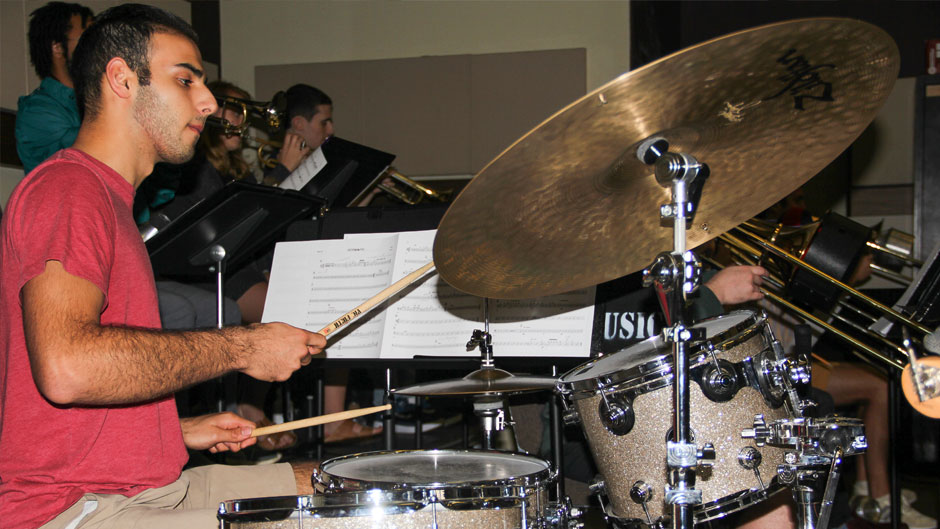Marcello Carelli, a rising junior at the University of Miami and drummer in the Stamps Music Scholars Jazz Quintet, was still decades from picking up his first drumsticks when in 1970 Miles Davis’ audacious seminal record, “Bitches Brew” turned the jazz world on its hi-hat.
Yet when Carelli and the 16 other Frost School of Music Concert Jazz Band student musicians take the stage January 15 for their “Bitches Brew Revisited: A Celebration of 50 Years of Jazz Fusion” performance, they’ll play with keen understanding of Davis’ place in history as a jazz icon and a well-practiced feel for his legendary music.
They’ve been well-schooled by Charles “Chuck” Bergeron, Frost professor of practice. A music historian and professional bassist, Bergeron has played Davis’ music for decades and to particular professional success in 2018 on “Electric Miles, Charles Pillow Large Ensemble” (Summit Records).
“There’s no connection for students without the educational component,” said Bergeron, explaining that all the concert jazz band students have gone through the two semesters of his Jazz History course. “They’ve listened to the records, and they understand how pivotal this record was in jazz history. In rehearsing the music, they now find themselves playing differently than in a traditional big-band setting.”
“I’m so excited to be playing this new version of the music,” said Carelli. “Miles Davis is one of the most – if not the most – influential jazz musicians for all of us here at the school.”
Bergeron, Carelli, and a cadre of Frost faculty and student musicians attended the Jazz Educators Network Conference (JEN) in New Orleans last week. As part of their visit, the students rehearsed at the famed New Orleans Center for the Creative Arts and then played from the “Bitches Brew” repertoire at a conference performance.
“What an amazing week at the conference,” Carelli said. “There were tons of talented young musicians from around the country, and some of my greatest musical influences were there. To be able to go up to them and just chit-chat like you’ve known them for years–incredible.”
A friendly collaboration
Bergeron is home-grown New Orleans. He and saxophonist Charles Pillow grew up together in the bayou city, honed their chops playing in the same high school band, savored gumbo and crawfish etouffee in the same historic West End restaurants that were later washed away by Hurricane Katrina in 2005. After earning degrees at Loyola University, they left the Big Easy for the Big Apple to follow music careers. Reuniting for Pillow’s “Electric Miles Large Ensemble”album was a rekindling of musical sparks.
The album was a success, and Bergeron hit on a way to further the celebration.
“We do concerts three times a semester, and we’re always looking for new and interesting projects,” he said. “It’s always nice to collaborate with an artist from another school – Charlie teaches at the Eastman School of Music – and especially satisfying to be able to work together with him at the JEN concert and then bring him to Miami.”
Miles’ music changed jazz
Bergeron explained that 2020 is a big year for jazz, marking the 100th anniversary of the birth of legends Charlie Parker and Art Blakey, and the 50th anniversary of the Miles Davis album that rocked the jazz world.
Bergeron was just nine when the album was released in 1970. He started out playing the electric bass, and it wasn’t long before he felt the sting of jazz purists’ notion that only acoustic instruments were “real.”
“I’m old enough to have lived that dark period of jazz music where the thought was that everything had to be acoustic, where all the grooves had to be swing,” he said. “The electric bass was looked down upon as if it were toy, not a real instrument.” Bergeron noted proudly that UM was the first music school to allow students to focus on the electric bass as their principle instrument in pursuing their degree.
Miles’ music imbued that dark period with new light. Though he grew up with traditional jazz, Davis continued to experiment and fuse an amalgam of styles. Bergeron, like many, believe Davis’ 1959 “Kind of Blue” to be the greatest jazz album of all time. In “Bitches Brew,” the renowned trumpeter pushed more edges, introducing rock-and-roll and rhythm-and-blues influences, and added electric instruments and synthesizers.
“‘Bitches Brew’ changed the style of jazz and justified a lot of other styles of American music,” Bergeron said. “The music has endured – it’s a head-turning thing.”
The two-set performance at UM Gusman Concert Hall on Wednesday, Jan. 15 will feature the Frost Septet in the first set and the Concert Jazz Band for the second. Pillow, Bergeron, Dean Shelly Berg, Martin Bejarano, and John Daversa, associate professor and chair of Studio Music and Jazz, will all play. And as part of his residency at Frost, NEA Jazz Master Saxophonist Dave Liebman, a Miles Davis sideman, is set to perform with both groups.

